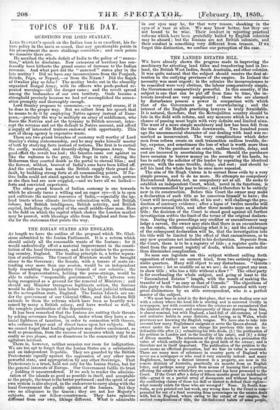THE IONIAN STATES AND ENGLAND.
AT length we have the outline of the proposal which Mr. Glad- stone submitted to the Ionian Parliament. It is a reform which should satisfy all the reasonable wants of the Ionians ; for it would undoubtedly effect a material improvement in the consti- tution of the local Government, and in its relation to the govern- ing country, England. The leading principle is, a better separa- tion of authorities. The Council of Ministers would be brought closer to the Governor ; the Senate, with a tenure of seats ex- tending over more than one session, would be an independent body resembling the Legislative Council of our colonies ; the House of Representatives, holding the purse-strings, would be able to enforce " responsiblevernment," their adverse vote being recognized as a ground forgo the removal of Ministers ; and should any Minister transgress legitimate action, the Ionians would be able to impeach him before the highest judicial tribunal in the metropolitan state, England. The Ionian Islands are un- der the government of our Colonial Office, and this Reform Bill extends to them the reforms which have been so heartily wel- comed by many a British colony, and have worked so well, to the complete pacification of the dependency.
It has been remarked that the Ionians are cutting their throats by asking severance from England, under whom they have a co- lonial lightness of taxation, in order to connection with Greece, who enforces 10 per cent of direct taxes upon her subjects. But we cannot forget that leading agitators may derive emolument, as well as promotion, from the success of measures which may be as costly as you please, and as disastrous to the community that the agitators mislead.
There is, however, neither occasion nor room for indignation. We are too apt to forget that the Ionian States are a substantive and an independent Republic. They are guarded by the British Protectorate equally against the oppression of any other more powerful state, and appropriation by any other Sovereign. That Protectorate is a trust, held not only for the Ionian States, but for the general interests of Europe. Our Government fulfils its trust - Jr holding it unsurrendered. If we seek to render the adminis- ration of the islands as good as possible in itself, and acceptable to the people, the trust is the better performed ; and the spirit of our own system is also obeyed, in the endeavour to carry along with the local Government the public opinion of the Ionians. But they owe no allegiance to the Queen ; they are not her Majesty's subjects, not our fellow-countrymen. They have opinions diSrent from our own, likings different. What is admirable
in our eyes may be, for that very reason, shocking in the eyes of a race so alien. We may know better, but they are not bound to be wise. Their conduct in rejecting practical reforms which have been gratefully hailed by English colonists may be absurd ; but the Ionians are not British colonists, and their conduct is something very different from treason. If we forget this distinction, we confuse our perception of the case.


























 Previous page
Previous page